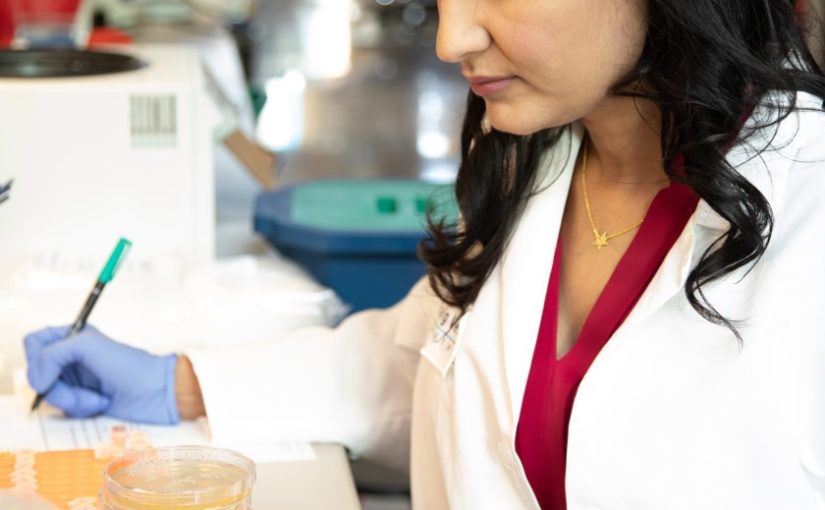By Jeanne Rawdin
“Elegant science” are not two words you hear put together very often. But for Carmel Valley resident Dr. Pamila Brar the phrase sums up her life’s career goals. Brar sees elegant science as “the promise of precision medicine” and works as the chief medical officer and clinical phenotyping research lead at the J. Craig Venter Institute in La Jolla. Her clinical research focuses on genomics, electronic medical records and artificial intelligence to identify various markers of health and disease.
“The promise of precision medicine is intoxicating to me,” Brar explains, “the ability to tailor care to each individual is so very compelling and feels right in such an intuitive way. I am passionate about helping to extend the healthy human lifespan, and to help us all understand what makes us who we are as individuals.”
Brar was recently appointed to the board of directors of the Clearity Foundation, which strives to improve the survival and quality of life for women with ovarian cancer. Brar says she was interested in joining the foundation because “it stands as a glowing example of an organization that provides the highest level of scientific knowledge to patients and their doctors, combined with truly helpful psychological support,” and at no charge to patients.
Brar points out that, “because ovarian cancer is such an elusive disease with no clear screening tools, it requires serious attention for us to outsmart it. It often contains multiple cell types even within a single tumor. So, in a way, it isn’t just one disease. It is a valiant enemy. And to add insult to injury, it affects women in the prime of their lives.”
Brar has personal experience in witnessing the devastating toll that ovarian cancer can take. During her internal-medicine residency, one of her interns was diagnosed with ovarian cancer at the age of 25. “I recall her complaining of vague symptoms and all of us attributing it to the demands of medical training,” she says. “I remember the shock of learning she had ovarian cancer. After all, she was one of us — a doctor. She wasn’t supposed to be the patient. Tragically, she died within six months of diagnosis. Her situation hit very close to home for me, and her death left a big hole within our close-knit group.”
Brar says she knew from around the age 7 or 8 that she wanted to be a doctor. She attended medical school at Louisiana State University at New Orleans and then trained at Scripps Clinic in La Jolla. She worked in general practice at Scripps Clinic from 1999 to 2009. “Then as we would say in my home state of Louisiana, I got a wild hair and decided that I wanted to stretch my wings and open my own private concierge medicine practice in La Jolla in 2010,” she explains. During that time, she became quite intrigued with the fertile science and biotech environment San Diego has to offer.
“I learned of the opportunity to participate in a new preventative precision medicine clinic at Human Longevity, Inc. founded by Craig Venter. I decided to leave my practice to participate in this new movement of genomics and precision prevention,” Brar says. She served as medical director at the Health Nucleus at Human Longevity from 2015 to 2019. In that role, she led a multidisciplinary team responsible for the integration of whole genome sequencing, microbiome, metabolome and whole-body imaging, as well as the delivery of results to the participants. And she started to dream big.
“My dream is that during my lifetime (I am 47), we will eradicate cancer, both through radical prevention, advanced screening and targeted and precise therapies,” she says emphatically. “I believe through the use of artificial intelligence, we will be able to make exponential advancements in the understanding of disease and health. We are inundated with data, and to be able to apply machine learning to these complex data sets, we can make connections faster and more profound than those that our minds can.”
One challenge that still exists, Brar admits, is gender bias in research. She says statistics back this up. “Even in animal studies,” she explains, “we have seen gender bias reproduced with more male mice in studies than female mice. It’s our job as doctors, researchers and patients to close that gap.” She encourages more women to participate in clinical trials and points out that awareness is key.
Despite the statistics, significant progress has been made. Women are now evenly represented in conditions such as diabetes, mental health, cancer and respiratory disease. But they still remain underrepresented in cardiology, HIV, chronic kidney disease, hepatitis and digestive disorders. “We still have a long way to go,” says Brar, “but we are making progress.”
Brar says she is very enthusiastic about the notion of understanding and realizing human potential and considers herself fortunate to be at the forefront of some of the most meaningful and potentially powerful research in the world.
“The team of incredible people that I have the honor to work with at the J Craig Venter Institute, at Human Longevity, Inc. and at the Clearity Foundation truly embody the best of the scientific community working for the good of the human race. Lucky me!”
For more on the Clearity Foundation, visit www.clearityfoundation.org.
This article was published by the Del Mar Times.


